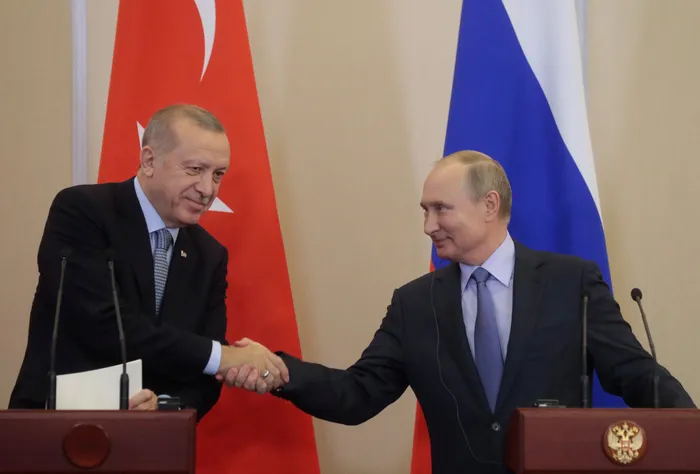The grain deal highlights the tricky Erdogan-Putin relationship

Picture: Sergei Chirikov/AFP - The Erdogan-Putin relationship stems from the possibilities that are afforded to these men by virtue of running authoritarian systems and their willingness to put boots on the ground, says the writer.
By Asli Aydintasbas
On Friday, the United Nations secretary-general announced that Russia and Ukraine agreed to restart shipments of blockaded grain, a move intended to ease a crisis that has exposed tens of millions of people, especially in Africa and the Middle East, to the threat of famine. The deal, signed in Istanbul, was a diplomatic victory for Turkey.
Earlier in the week in Iran, we saw Turkish President Recep Tayyip Erdogan and Russian President Vladimir Putin smile for the cameras in what was Putin's first major overseas summit since the start of the Ukraine war. "I want to thank you for your mediation efforts," Putin told Erdogan, according to the Kremlin.
The agreement will keep raising questions about the relationship between Erdogan and Putin. Is there mutual admiration - do they have a type of reflexive strongman empathy for one another? Or are they adversaries looking after their own interests?
A bit of both.
The deal created an export mechanism for Ukrainian grain - that is, what is not stolen by Russian forces in occupied territories - across the Black Sea, through safe corridors.
Security would be provided by a Turkey-led naval mission, and Ukraine is willing to provide coordinates for narrow pathways off the port of Odessa, which has been mined to prevent a Russian assault, and two other ports currently cut off by a Russian naval blockade, UN officials said. A parallel agreement is supposed to facilitate Russian grain and fertiliser exports.
Ukraine desperately needs the grain income and also wants to empty its silos and storage facilities to make room for this year's harvest. But Kyiv also needs to be certain that the corridors for export vessels are not going to be used later for an attack on Odessa. It will be up to the United Nations and Turkey to make sure Ukraine's goodwill is not abused.
Let's hope this works. Food shortages have been driving up prices across the Middle East and Africa, and this is a way to prevent the "hunger catastrophe" that the UN World Food Programme has been warning about.
But the deal also highlights Erdogan's unique way of dealing with Putin - he avoids the moral "trappings" of Western leaders, but with results that affect millions. Both men are transactional and cynical and have disdain for liberal norms. They fight on opposite ends, as in Syria and Libya, but manage to sit and negotiate for quick results - as cease-fires in those countries have shown.
This fascinating relationship calls for both competition and camaraderie - and often comes at the expense of Western influence.
Ottomans and Russia fought different wars for several centuries, even over parts of modern Ukraine. Turkey and Russia ended up on different sides of the Cold War. But over the past decade, the two countries have grown closer, with Turkey commissioning Russia to build its first nuclear reactor and purchasing an advanced Russian S-400 missile defence system, even at the risk of facing US sanctions.
Turkey has refused to go along with Western sanctions on Russia, and the daily Turkish Airlines flights to Russian cities provide an economic lifeline for the country. Not surprisingly, Russia's oligarchs have been favouring the Turkish Riviera for their yachts this summer.
At the same time, Turkey and Russia have engaged in confrontations in Libya and Syria, with Turkish drones destroying Russian Pantsir missile systems as their proxies fight on the battlefield. Moscow was directly involved in an air attack on Turkish troops in Syria in 2020.
Turkey downed a Russian warplane in 2015. In Ukraine, despite a cautious balancing act not to antagonise the Kremlin, Ankara has been steadily supplying Kyiv with TB2 drones to use against Russian forces. Turkey has also closed off the Turkish Straits to the Russian navy. These actions have been critical for Ukrainian defence.
But it is not hard to see why both leaders might want this deal to work. Turkey and Russia are both revisionist powers that want a greater role on the world stage and, despite their differences, have managed to expand each other's zone of influence.
This relationship is not one that any Western leader could - or would want to - replicate. It may help project power and polish their image at home, something that Erdogan certainly needs ahead of the 2023 elections. But at its core, the Erdogan-Putin relationship stems from the possibilities that are afforded to these men by virtue of running authoritarian systems and their willingness to put boots on the ground. The democratic world must see through its calculations and ambitions.
But if this grain deal goes through, somehow, this peculiar relationship will end up benefiting Ukraine, Ukrainian farmers and millions facing food shortages. It will help Erdogan and Putin, both domestically and in terms of their global image. And it will also demonstrate that Western influence in Ukraine and beyond still has very real limits.
Asli Aydintasbas is a senior fellow at the European Council on Foreign Relations.
This article first appeared in The Washington Post.